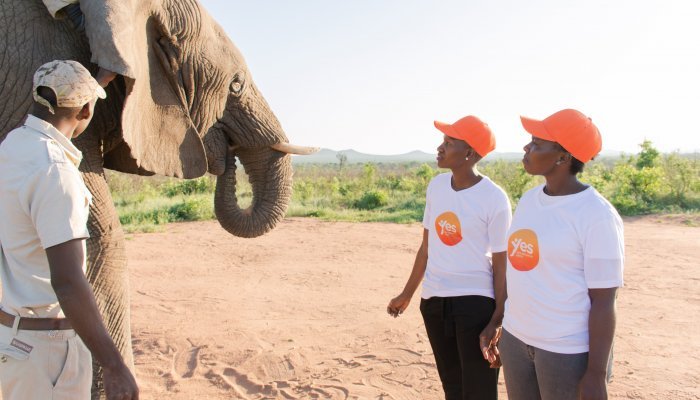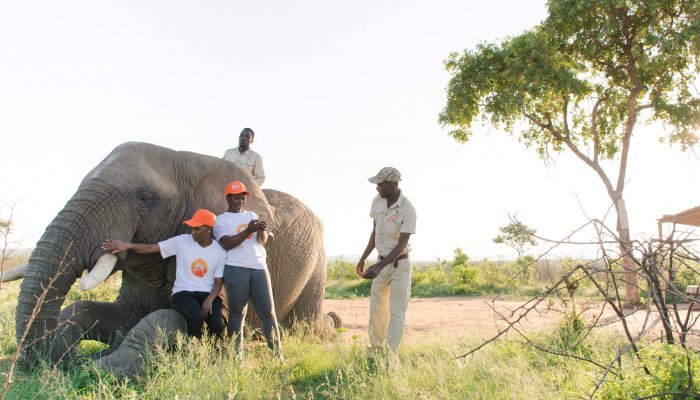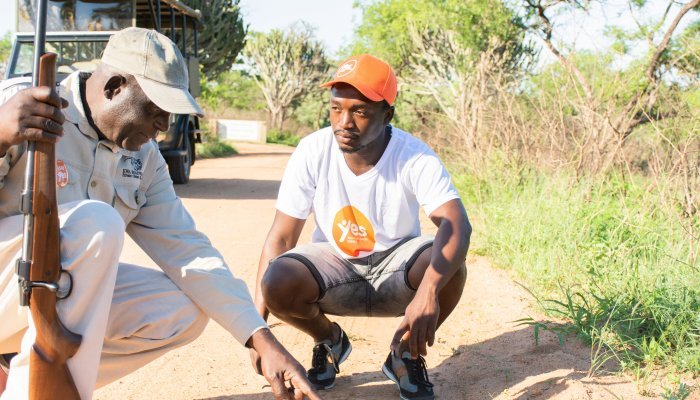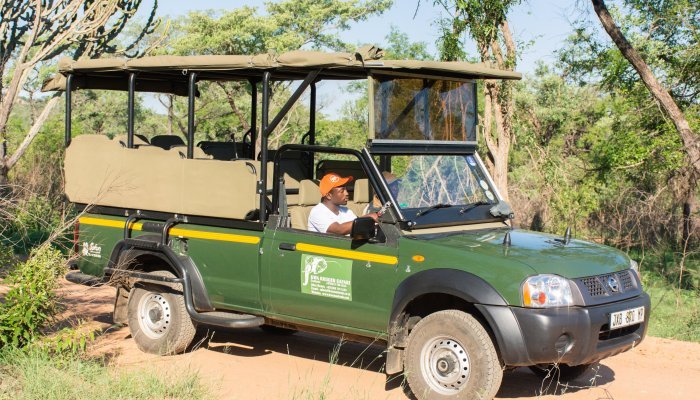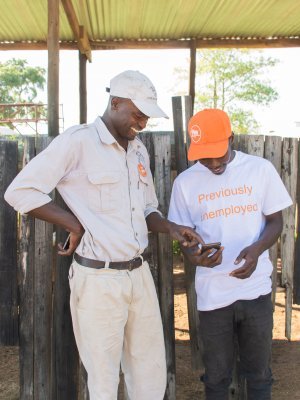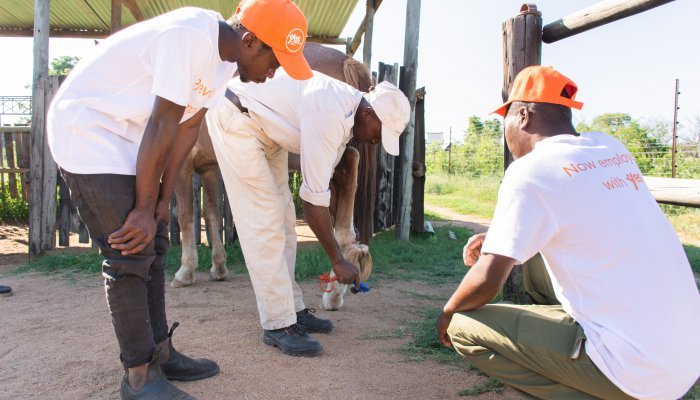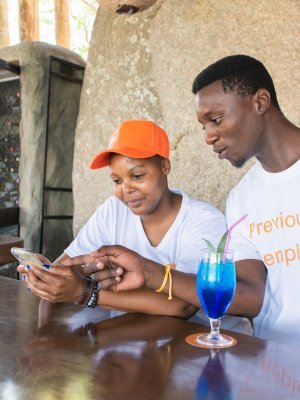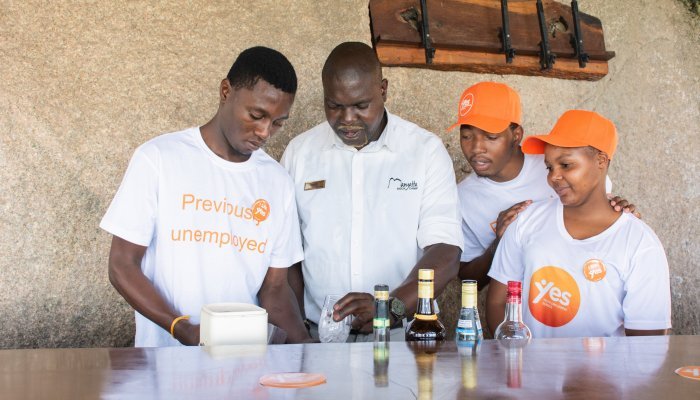The story of South Africa’s prospects cannot be told without examining the tale of its two economies. The formal economy and the “other one”, often known as the informal or shadow economy. At a GIBS fintech event in 2019, I heard Michael Vacy-Lyle, former CEO of FNB Commercial Banking, use the term “unseen economy”. He noted that parts of this economy are very “formalised” in that they are as structured, sophisticated and well-managed as the formal economy.
The term stuck with me and raised several questions, including “how can you track what you can’t see”? While there is some data available, there is not enough, and the unseen economy remains misunderstood.
...the unseen economy remains misunderstood.
The data we do have
According to the International Labour Organization (ILO)1, the informal economy in sub-Saharan Africa makes up nearly 86% of all employment, and 93% of the world’s informal employment is in emerging and developing countries. South Africa’s informal economy is relatively small compared to some other emerging and developing markets, but its size seems to have been fairly consistent over the last few decades.
That said, while several studies have attempted to measure South Africa’s informal sector, results vary depending on the methodologies used. South African Market Insights cites estimates of the informal economy’s size as ranging between 7% and 13% of the total economy.
The Quarterly Labour Force Survey from Statistics South Africa, which provides official unemployment figures, shows there are approximately three million people employed in (non-agricultural) informal sector work – roughly 20% of total employment. The ILO puts this at closer to five million. That’s a big difference.
When South Africa’s official unemployment rate rose above 29% in 2019, GG Alcock, speaker, author and founder of Kasinomics, raised eyebrows by suggesting to BizNews2 that the real unemployment rate – taking into account informal economy “jobs” – was closer to 12%. Critics quickly poked holes in Alcock’s calculations, saying they were based on personal experience and anecdotal evidence rather than verifiable data.
Dr. Tashmia Ismail-Saville, chief executive at the Youth Employment Service (YES) and former head of the Inclusive Markets Programme at GIBS, says articles like Alcock’s are concerning. “It takes many people to focus policymakers on a real problem. Anecdotal opinions detract from the really serious issue of unemployment. We cannot afford to be complacent or lose the urgency to structurally shift to give a better chance to those left out of the system,” she says. “Yes, there are people in informal employment, but it is fragile, inconsistent and unprotected. There are also far more young people sitting around doing nothing,” she says. “The very nature of the informal economy makes it hard to get statistics and to understand how money is moving.”
Added to this, she says, is that remuneration in the informal sector is often below wage rates that are deemed acceptable in the formal sector. According to Mike Rogan, associate professor at Rhodes University, and Caroline Skinner, senior researcher at the African Centre for Cities at the University of Cape Town, 73% of informal operators earn well below SARS’s income tax threshold of R79,000 per annum.3
How did we get here?
Jesse Weinberg, FNB Business, SME segment head, says the reason for the gap between South Africa’s formal and unseen economies is the lack of “user nuances” in the way banks and governments have traditionally designed financial systems. The country’s financial system is designed to work in a first-world economy and doesn’t always cater to the realities on the ground.
“When you drill down into the reasons for the informal economy, they all point to this thing called cash,” Weinberg says. “When you’re operating in a cash world, visibility of transactions decreases dramatically, and you’re reduced to tracking it mainly according to money supply.”
While formal economy transactions take place within organised systems and are therefore trackable, once money moves into the cash economy, visibility plummets.
Weinberg says there are generally a few reasons cash is preferred – either it’s what works in the environment (e.g. minibus taxis require fares to be paid in cash), people lack an alternative (e.g. a foreign national unable to open a bank account), or they wish to stay off the radar (e.g. cash-only businesses avoiding taxation). Ismail-Saville adds that banks are also expensive, but with cash a transaction is “free”.
While Weinberg says financial institutions have made massive strides in financial inclusion, the cycle is not complete until consumers who now have bank accounts can pay merchants electronically. “We can’t look at financial inclusion solely from a consumer side – it’s got to include merchants too.”
...once money moves into the cash economy, visibility plummets.
Persuasion tactics for informal sector merchants
Convincing merchants to move from the informal to the formal economy offers benefits for all: government increases its revenue collection, cuts down illicit financial flows, and boosts data points; financial institutions do more business, thereby improving their liquidity and lending capability; and, merchants gain access to credit, working capital and insurance products, helping them grow and protect their businesses. But persuading cash-economy businesses to formalise is no easy task and Weinberg believes it requires both push and pull factors.
Government is predominantly responsible for push factors through regulation, but there also needs to be a balance – too much red tape will hinder formalisation. “The pull factors are about convincing merchants to formalise with a value proposition that says, ‘This is going to be good for you and the benefits are going to outweigh the costs’,” says Weinberg.
This is where FNB has significantly changed its approach. “There is a gap between solutions and regulation, and products and services that are designed for Sandton businesses, versus survivalist businesses or even just sophisticated cash businesses,” Weinberg says. It requires, “a solution that speaks their language, with the right level of pricing.”
This involves developing trust and looking at how to solve merchants’ day-to-day operational challenges, as well as demonstrating that a solution will help them make or save money.
The way we define employment is holding us back.
For example, by providing business owners with a device that helps them manage inventory and schedule deliveries, FNB has had success in building trust and showing merchants the benefits that technology can offer. From there, it’s a small step to merchants using the same device to sell airtime, then accepting card payments. Every level up the rung of the financial inclusion ladder is another towards formalisation.
Weinberg says that data from these devices can also be used to help redesign credit and insurance products. For example, instead of requiring proof of income, banks can track the business’s purchases. “If over a 12-month period they’re consecutively buying a million rands’ worth of stock a month, that stock is being funded somehow, even if you can’t see the receipts,” Weinberg says. “That’s a good example of one way of measuring informal sector transactions that is getting a lot of global attention – putting more emphasis on the supply chain side.”
Redefining employment
While there is disagreement on how to help informal businesses join the formal economy, and how to unlock the nascent potential in the sector, most agree that something needs to change.
“The way we define employment is holding us back,” says Ismail-Saville. She tells the story of a woman entrepreneur from Alexandra who ran three successful enterprises – a school tuckshop that employed four or five people, a thriving stokvel and a traditional healing practice. “Yet, she always introduced herself at visits as being unemployed. She believed she didn’t have a real job, because she had no payslip.”
Ismail-Saville’s point is that the language we use is powerful and that having a payslip has become the holy grail of accessing credit or financial products. There is little aspiration to be self-employed, and limited support for those who are.
She says alternative financial institutions, like the Development Bank of South Africa, along with NGOs and fintechs, have a role to play in changing the way we view financial inclusion and the type of data we employ. “If you look at some of these new fintechs, they have clever behavioural models driving how they loan money,” she says. “Once these models are in play, it’s important to publish data on new methods to understand risk rather than pure dependency on credit history or payslips.”
By shifting the way we talk about employment and the models we use to develop financial products for the informal economy, South Africa could improve support for entrepreneurship and grow SMMEs. This would then need to be complemented by government initiatives and regulation, for example around tax incentives for entrepreneurs.
The idea is to make it easier for people to be a part of the formal economy. “At the moment, the costs of formalisation are so high, it just doesn’t make sense to people who are already financially strained. In a post COVID-19 world, these businesses will need to be formalised given their fragility and need for government support to stay alive,” says Ismail-Saville.
Three ways business can help:
1. Improve financial literacy: As WEF notes, “The public and private sectors need to rethink financial literacy, using innovative models such as gamification and mobile messaging services, to encourage behaviour change at scale.”
2. Relevant financial products for the informal sector: Weinberg notes that financial institutions need to put in the time and effort required to understand the challenges faced by people operating in the informal sector to develop products that meet their needs at a viable price point.
3. Open doors to formal sector employment: YES is a business-driven initiative that focuses on black unemployed youth aged 18 to 35. Along with its partners, YES provides a 12-month quality work experience for youth. Absorption rates of participants have been an impressive 43%. The YES digital training programme, which is accessed via a YES smartphone, helps create some of the behavioural shifts required to give participants essential skills to move them from the informal to the formal economy. Modules cover subjects such as building a growth mindset and resilience, professionalism, business etiquette, communication and personal financial management.
“We’re taking them from a precarious position where they’re not protected by labour laws, are potentially open to exploitation, and can’t build a track record, and helping them get a foot in the door to show what they can do,” says Ismail-Saville. “After the year of employment, youth are de-risked and more likely to get an opportunity. A large-scale EU study on employer preferences showed that some job experience could make up for lower skills or poor qualification.”
Visit www.yes4youth.co.za for more information.
1https://www.ilo.org/global/about-the-ilo/newsroom/news/WCMS_627189/lang--en/index.htm
2https://www.biznews.com/good-hope-project/2019/08/22/gg-alcock-recognise-informal-economy
3https://www.news.uct.ac.za/article/-2019-09-12-in-defence-of-sas-informal-economy
COVID-19 and the informal economy
At the time of going to press, South Africa and the rest of the world are grappling with the realities of the COVID-19 pandemic. As governments have instituted lockdowns, whole economies have taken a dive, and the informal economy is no different.
Patrick Belser, ILO senior economist, points out that “Across the world, two billion workers (61.2% of the world’s employed population) are in informal employment. They are more likely to face higher exposure to health and safety risks without appropriate protection, such as masks or hand disinfectants. Many also live in cramped housing, sometimes without running water.”
This means they are not only more at risk of contracting the virus, but preventative measures for wider populations – like lockdowns – are less effective. Income support and policy measures therefore need to extend to the most vulnerable of people and not just the formal sector.
President Cyril Ramaphosa has announced a range of COVID-19 support measures, including the Solidarity Fund, financed chiefly through voluntary donations, a Temporary Employee Relief Scheme for employees within companies affected by COVID-19, and tax subsidies for low-income private sector workers. Yet these are unlikely to help the informal sector.
Where the government has offered help to the informal sector is by allowing spazas to trade initially and then extending that to include informal food traders, such as roadside fruit and vegetable sellers. However, these traders all need to get a permit, and footage quickly emerged of soldiers dispersing those attempting to do so at Johannesburg’s municipal offices.
In fact, government seems to be using its COVID-19 interventions to register and document people within informal trade. This is a useful data collection exercise and may yield benefits later, but for now it’s created bottlenecks in the system, putting further stress on informal traders.
Development specialist Kate Phillip made the case for a special COVID-19 grant, which she suggested be rolled out over a five-month period to the most vulnerable, tapering off in the final two months. Stephen Devereux, research fellow, Institute of Development Studies, University of Sussex, suggested an emergency lockdown hardship fund to deliver a “guaranteed safety net for those whose livelihoods have been cut off by the lockdown”.
The Food and Agriculture Organization of the UN compiled a useful document summarising the impact of COVID-19 on informal workers globally, including suggestions on potential interventions, such as expanding social protection coverage to informal workers in agriculture and rural sectors, as well as timely cash transfers, food or in-kind distributions.
At the time of writing, South Africa was waiting to see whether the initial lockdown period would be extended, and what other government interventions would be introduced. It remains to be seen how these decisions will play out in both the formal and informal economies.


